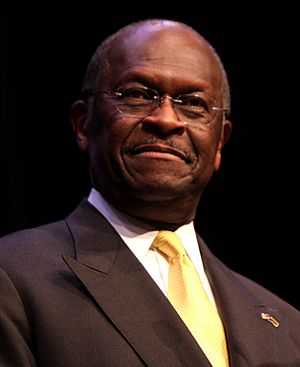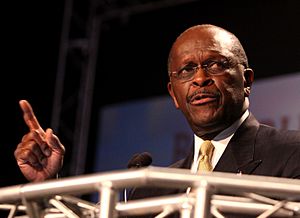Herman Cain facts for kids
Quick facts for kids
Herman Cain
|
|
|---|---|

Cain in 2011
|
|
| Chair of the Federal Reserve Bank of Kansas City | |
| In office January 1, 1995 – August 19, 1996 |
|
| President | Thomas M. Hoenig |
| Preceded by | Burton Dole |
| Succeeded by | Drue Jennings |
| Personal details | |
| Born | December 13, 1945 Memphis, Tennessee, U.S. |
| Died | July 30, 2020 (aged 74) Georgia, U.S. |
| Cause of death | COVID-19 |
| Political party | Republican |
| Spouse |
Gloria Etchison
(m. 1968) |
| Children | 2 |
| Education | Morehouse College (BS) Purdue University (MS) |
Herman Cain (December 13, 1945 – July 30, 2020) was an American businessman and political activist. He was part of the Republican Party and the Tea Party movement. Cain was born in Memphis, Tennessee. He grew up in Georgia and earned a degree in mathematics from Morehouse College.
Later, he got a master's degree in computer science from Purdue University. He worked for the U.S. Department of the Navy. In 1977, he joined the Pillsbury Company. He became a vice president there. In the 1980s, Cain was very successful at Burger King. This led Pillsbury to make him the chairman and CEO of Godfather's Pizza. He held this role from 1986 to 1996.
Cain also served as chairman of the Federal Reserve Bank of Kansas City Omaha Branch from 1989 to 1991. He was chairman of the main Federal Reserve Bank of Kansas City until 1996. In 1995, he joined the Kemp Commission. In 1996, he advised Bob Dole during his presidential campaign. From 1996 to 1999, Cain was the president and CEO of the National Restaurant Association.
Contents
Early Life and Family
Herman Cain was born on December 13, 1945. His parents were Lenora Davis Cain and Luther Cain. His mother worked as a cleaning woman. His father worked as a barber, janitor, and chauffeur. Cain said his family was "poor but happy" when he was growing up.
His mother taught him that success comes from your spirit, not from how much money you have. His father worked three jobs. He wanted to own his own home and send his two sons to college. He achieved both of these goals.
Cain grew up in Atlanta, Georgia. He went to S. H. Archer High School. He also attended Antioch Baptist Church North. His family later moved to the Collier Heights neighborhood. He finished high school in 1963.
Education and Business Career
In 1967, Cain earned a Bachelor of Science degree in mathematics from Morehouse College. In 1971, he received a Master of Science degree in computer science from Purdue University. While studying, he worked as a ballistics analyst for the U.S. Department of the Navy.
After getting his master's degree, Cain left the Navy. He started working for Coca-Cola in Atlanta. He was a computer systems analyst there. In 1977, he moved to Minneapolis to join Pillsbury. By 1978, he was the director of business analysis for their restaurant and food group.
Leading Burger King and Godfather's Pizza
When he was 36, Cain was asked to manage 400 Burger King stores. These stores were in the Philadelphia area. Burger King was a part of Pillsbury at the time. Under Cain's leadership, his region showed great improvement in three years.
Cain created the "BEAMER program" at Burger King. This program taught employees, mostly teenagers, how to make customers smile. It was a big success. Sales started to go up steadily within three months.
Because of his success at Burger King, Pillsbury made him president and CEO of another company they owned, Godfather's Pizza. When he started on April 1, 1986, Godfather's Pizza was struggling. It had dropped from the third-largest pizza chain to the fifth. Under Cain, Godfather's closed about 200 restaurants. They also cut many jobs. This helped the company become profitable again. In 1988, Cain and other investors bought Godfather's from Pillsbury.
Work with Federal Reserve and Restaurants
Cain was chairman of the board for the Federal Reserve Bank of Kansas City Omaha Branch from 1989 to 1991. The Federal Reserve is like the central bank of the U.S. It helps manage the country's money and economy. He then became a director of the main Federal Reserve Bank of Kansas City in 1992. He was deputy chairman from 1992 to 1994. Then he served as chairman until August 1996. He left to get involved in national politics.
Cain left Godfather's Pizza in 1996. He moved to Washington, D.C.. From 1996 to 1999, he was the CEO of the National Restaurant Association. This group represents restaurants and works to influence laws. Cain had served on its board before. His work there helped him connect with many Republican politicians.
Cain also served on the boards of other companies. These included Nabisco and Whirlpool. After his time with the restaurant group ended in 1999, he returned to Omaha, Nebraska. In 2000, he moved back to his hometown of Atlanta.
Media and Public Speaking
Cain wrote a regular newspaper column. It was shared by the North Star Writers Group. He also appeared in a 2009 documentary called An Inconvenient Tax.
From 2008 to 2011, Cain hosted The Herman Cain Show. This was a talk radio show on station WSB in Atlanta. In 2012, he started providing daily comments for WSB again. He also sometimes filled in for other radio hosts.
On January 21, 2013, Cain took over Neal Boortz's radio talk show. This happened after Boortz retired. In February 2013, Fox News Channel announced that Cain would join them as a contributor. He appeared on shows like Watter's World.
Awards and Recognition
In 1996, Cain received the Horatio Alger Award. This award honors people who have achieved success despite challenges. He also received honorary degrees from several universities. These included Morehouse College and Purdue University.
Jack Kemp, a former government official, called Cain "the Colin Powell of American capitalism." He said Cain helped expand opportunities and create jobs for many people.
Black Voices for Trump
During the 2020 election, Cain was a co-chairman for Black Voices for Trump. This group supported Donald Trump's campaign.
Political Activities
Debate on Health Care
In 1994, Herman Cain was the president-elect of the National Restaurant Association. He spoke out against President Bill Clinton's health care plan. He argued that the plan would be too expensive for businesses. He especially worried about small businesses.
Jack Kemp was very impressed with Cain's performance. As a result, Cain was appointed to the Kemp Commission in 1995. This moment was seen as Cain's important start in national politics.
Advising Bob Dole's Campaign
Cain was a senior economic adviser for Bob Dole's presidential campaign in 1996. This was during the 1996 United States presidential election.
Presidential Campaigns
Cain briefly ran for the Republican presidential nomination in 2000. He later said he ran more to share his ideas than to win. He felt that George W. Bush was already the favored candidate. However, Cain believed he had a better message. After ending his campaign, he supported Steve Forbes.
In 2004, Cain ran for a U.S. Senate seat in Georgia. This seat became open when Zell Miller retired. Cain sought the Republican nomination. He faced congressmen Johnny Isakson and Mac Collins. Cain finished second in the primary election. He did not win the nomination.
Work with Political Groups
Starting in 2005, Cain worked for Americans for Prosperity (AFP). This is a political advocacy group. Several AFP employees later joined Cain's 2012 presidential campaign team. Cain also received money for speaking at AFP events.
In 2006, Cain recorded radio ads. These ads encouraged people of color to vote Republican. A group called America's PAC funded these ads.
2012 Presidential Campaign
Herman Cain was a strong supporter of the Tea Party movement. He spoke at many Tea Party rallies in 2010. In December 2010, he announced he was thinking about running for president in 2012. He officially announced his candidacy on May 21, 2011, in Atlanta.
Winning Straw Polls
Cain's speeches to conservative groups were very popular. In late 2011, he won several "straw polls." These are unofficial votes taken at political events. He won the straw polls for the Florida Republican Party, TeaCon, and the National Federation of Republican Women's Convention. People often found Herman Cain to be a very likable candidate.
The 9–9–9 Plan
In July 2011, Cain introduced his tax plan. He called it the "9–9–9 Plan." This plan would have replaced the existing tax system. It suggested a 9-percent tax on business transactions. It also proposed a 9-percent personal income tax. Finally, it included a 9-percent federal sales tax.
Cain said his plan would make the tax system simpler and fairer. He argued it would help the economy grow. Some people supported the plan, while others worried it might shift more taxes onto poorer people. Cain later said that people at or below the poverty level would not pay the income tax part of the plan.
Ending the 2012 Campaign
On December 3, 2011, Cain decided to end his presidential campaign. A report later showed that Cain was the "most covered candidate" among Republicans that year.
Cain's Solutions Revolution
After ending his campaign, Cain started "Cain's Solutions Revolution" in January 2012. His goal was to get members of Congress to support his 9–9–9 Plan. He wanted to keep his ideas alive. He promoted this movement with a bus tour and a new website.
Cain also spoke at a large rally hosted by Stephen Colbert. This rally was described as the biggest campaign rally during that Republican primary season.
Idea for a Third Political Party
Cain supported Mitt Romney in the 2012 election. However, Romney lost to President Obama. After this, Cain said he believed the Republican Party no longer truly represented conservatives. He suggested that a new, strong third political party might be needed in the United States.
Personal Life
Herman Cain married Gloria Etchison in 1968. They had two children, Melanie and Vincent. They also had four grandchildren.
Cain was an associate minister at the Antioch Baptist Church North in Atlanta. He had joined this church when he was 10 years old. The church is part of the National Baptist Convention.
In 2011, during his presidential campaign, Cain's wealth was estimated to be between $2.9 million and $6.6 million. His income for 2010 and 2011 combined was between $1.1 million and $2.1 million.
Health and Passing
In 2006, Cain was diagnosed with colon cancer. The cancer had spread to his liver. Doctors gave him a 30 percent chance of survival. He had surgery and chemotherapy. After treatment, the cancer was reported to be gone.
Herman Cain passed away on July 30, 2020. He was 74 years old. His death was due to complications from COVID-19.
See also
 In Spanish: Herman Cain para niños
In Spanish: Herman Cain para niños
- List of African-American Republicans
- Political positions of Herman Cain
 | Emma Amos |
 | Edward Mitchell Bannister |
 | Larry D. Alexander |
 | Ernie Barnes |


